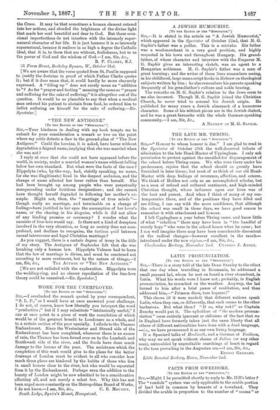" THE NEW ANTIGONE. "
its THE EDITOR OF TILE “Sexcuma."] SIR,—Your kindness in dealing with my book tempts me to submit for your consideration a remark or two on the point where my critic detects a flaw in the ground-plan of " The New Antigone." Could the heroine, it is asked, have borne without degradation a feigned name, implying that she was married when she was not ?
I reply at once that she could not have appeared before the world, in society, under a married woman's name without falling below her own standard. But what were the facts of the case ? Hippolyta (who, by-the-way, had, strictly speaking, no name, for she was illegitimate) lived in the deepest seclusion, and the change of name affected her lover rather than herself. She had been brought up among people who were perpetually masquerading under fictitious designations ; and she cannot have thought herself degraded in following her mother's ex- ample. Might not, then, the "marriage of true minds "— though really no marriage, and terminable on a change of feeling—have justified in her eyes the assumption of her lover's name, or the sharing in his disguise, while it did not allow of any binding promise or ceremony ? I wonder what the casuists of free-love would say. Is there not a kind of deception involved in the very situation, so long as society does not com- prehend, and declines to recognise, the tertium quid between casual intercourse and legal Christian marriage ?
As you suggest, there is a certain degree of irony in the title of my story. The Antigone of Sophocles felt that she was breaking only a human law. Hippolyta Valence had to learn that the law of marriage is divine, and mast he construed not according to mere sentiment, but by the nature of things.—I
am, Sir, &c., THE AUTHOR OF "THE NEW ANTIGONE." [We are not satisfied with the explanation. Hippolyta wore the wedding-ring, and no clearer repudiation of the free-love theory could be conceived.—En. Spectator.]


















































 Previous page
Previous page